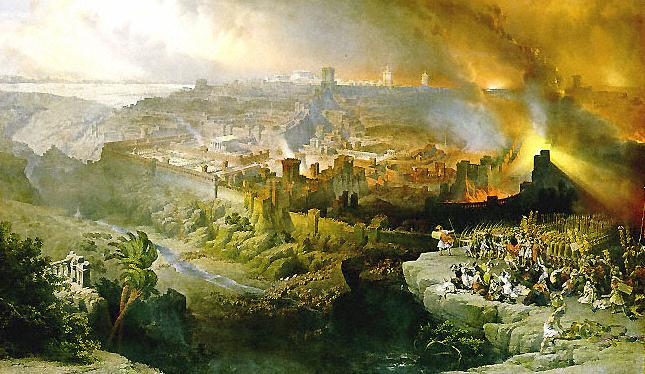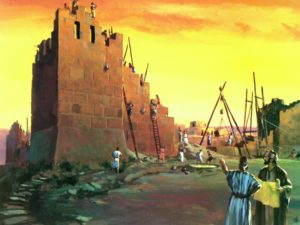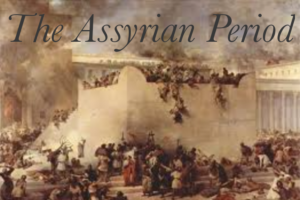The Assyrian Period was graphic to say the least. The Babylonian Period that follows is hardly less violent as the southern tribe of Judah learns what it means to renege on their covenant with God. As a faithful Father, God reminds Judah what He meant when He said hundreds of years before, “Don’t play in the street.”
Introducing the Babylonian Period
This period of history covers the following sections of the Old Testament- 2 Kings 24-25; 2 Chronicles 36; Daniel; Jeremiah; Ezekiel. The Babylonian Empire would take the stage of world dominance after the Assyrians. Remember, the Assyrians spanked the northern 10 tribes of Israel starting in 2 Kings 10:32 and consummating in 722 B.C. as they went into full-fledged captivity. Judah should have been watching and learning from his big brother, and while he was more faithful to the covenant in general, Judah would finally be educated on obedience in 586 B.C. by the Babylonian King Nebuchadnezzar. Isaiah prophesied of Judah’s emasculation by Babylon in 2 Kings 20:17-18 (appx. 700 B.C.). Hezekiah was King of Judah when Isaiah spoke those coarse words. He was followed by Manasseh, Amon, and Josiah. While Josiah was one of Judah’s most honorable kings, Manasseh was such a dirt bag and provoked God to anger so much so that Josiah’s glimpse of glory could not undue all the evil his grandfather had incited. It was during the days of Josiah that the infamous Jeremiah began prophesying (Jeremiah 1:1). Jeremiah rarely had anything positive to say to Judah, and once again words of judgement by the hand of Babylon became the talk of the town (2 Kings 23:26-27). Slowly, Babylon came on the stage, and in 605 B.C. Nebuchadnezzar took the first wave of Judah captive just like Jeremiah said would happen (2 Kings 24:1 & Jeremiah 27:5-7). Daniel and his three best friends were part of this initial exile. Eight years later in 597 B.C., Nebuchadnezzar would come again, taking even more men, women, and children captive to Babylon and looting the temple in Jerusalem (2 Kings 24:10-16). ![[Tags] 586-300x225 Lesson 11- What You Need to Know About the Babylonian Period](https://fiveminutebiblestudy.com/wp-content/uploads/2018/05/586-300x225.jpg) Finally, in 586 B.C., Nebuchadnezzar came back for one last hoorah, taking the remaining inhabitants into Babylonian exile, killing those that resisted, and burning the national symbol of Yahweh among His people- the temple (2 Kings 25:1-21). This straightforward retelling of the events that led up to Jerusalem’s destruction provides the skeleton to the Babylonian Period. Now, let’s put meat on the bones by revealing the significance to those things that took place during these captivities.
Finally, in 586 B.C., Nebuchadnezzar came back for one last hoorah, taking the remaining inhabitants into Babylonian exile, killing those that resisted, and burning the national symbol of Yahweh among His people- the temple (2 Kings 25:1-21). This straightforward retelling of the events that led up to Jerusalem’s destruction provides the skeleton to the Babylonian Period. Now, let’s put meat on the bones by revealing the significance to those things that took place during these captivities.
Covenant & Prophecy
The concept of covenant was introduced and outlined in Lesson 2 of this series. The covenant God made with Israel upon formally anointing them as a nation at Mt. Sinai was summed up in Lesson 4. The importance of keeping that covenant was then detailed in Lesson 5. Why so much emphasis on God’s covenant with Israel during this lengthy series? Because this “bond in blood” God made with Israel is at the foundation of Israel’s history from Canaan to Babylon. The covenant was the measuring stick of a king’s faithfulness, and the covenant conditions that Moses gave in Deuteronomy 28-29 give the answer to the question, “Why has God done this to Israel?” God never gives blessings without conditions. Many Jews in Moses and Jeremiah’s day likely thought like the masses of evangelical Christians today: the moment you enter covenant with God determines your eternal destiny. Moses never said that, and Jeremiah confirmed the same.
In the chapters leading up to Deuteronomy 28, Moses has renewed the Sinai covenant with Israel. Then in verses 1-15 of this chapter, Moses lists all the blessings that will come to Israel “if” they keep the covenant. In the 53 verses that follow, Moses lists in vivid detail what will happen to Israel “if” they renege on the covenant. Notice what Moses says would happen (appx. 1300 B.C.), and then note how Jeremiah describes Babylon’s treatment of Israel 700 years later and in fulfillment of the covenant curses.
Deut. 28:49– “The Lord will bring a nation against you from afar, from the end of the earth, as swift as the eagle flies, a nation whose language you will not understand, a nation of fierce countenance…” Jeremiah 5:15– “Behold, I will bring a nation against you from afar, O house of Isarel…a nation whose language you do not know, nor can you understand what they say.
Deut. 28:53– “You shall eat the fruit of your own body, the flesh of your sons and your daughters…in the siege… (54) The sensitive and very refined man among you will be hostile toward his brother, toward the wife of his bosom, and toward the rest of his children whom he leaves behind, (55) so that he will not give any of them the flesh of his children whom he will eat, because he has nothing left… (56) The tender and delicate woman among you…will refuse to the husband of her bosom, and to her son and her daughter, (57) her placenta which comes out from between her feet and her children whom she bears; for she will eat them secretly for lack of everything in the siege… Jeremiah 19:9– “And I will cause them to eat the flesh of their sons and the flesh of their daughters, and everyone shall eat the flesh of his friend in the siege…”
Deut. 28:64– “Then the Lord will scatter you among all peoples, from one end of the earth to the other…” Jeremiah 25:33– “And at that day the slain of the Lord shall be from one end of the earth even to the other end of the earth.”
This is a small sample listing of Moses’ promises followed by its fulfillment through Babylon. Study Deuteronomy 28 and detail and then look for repeated language while reading Jeremiah. Israel did not keep their pact, but God kept His. God always keeps His pact. The Babylonian Period says, “Fear God.”
Next- What You Need to Know About the Persian Period



